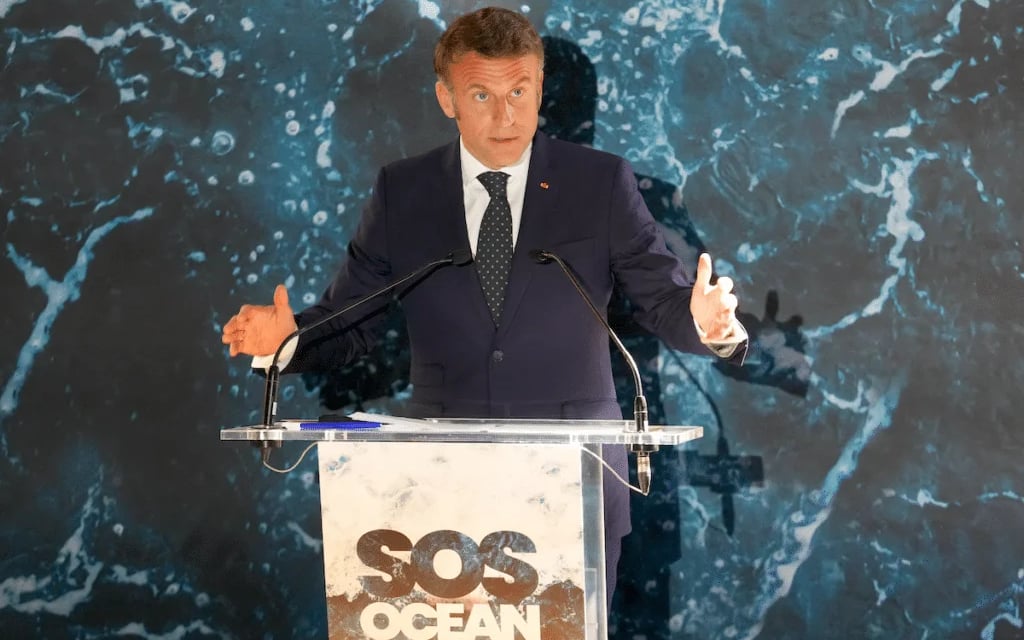UN Ocean Conference in Nice : France at a crossroads
EUROPE
Thomas dos Remedios
5/16/20255 min read


One month ahead of the Third United Nations Conference on the Oceans (UNOC), to be held in Nice from 9 to 13 June 2025, France is setting out an ambitious environmental agenda, but is struggling to clarify its intentions. With uncertain diplomatic positions, high scientific expectations and pressure from NGOs, this international event promises to be a test of credibility for French maritime policy.
A STRATEGIC CONFERENCE IN A TENSE GLOBAL CONTEXT
The Nice Conference comes at a pivotal time for global environmental governance. Along with COP30, scheduled for November in Belém (Brazil), the June UNOC is one of the two major diplomatic meetings on the environmental challenges of 2025. Ten years after the Paris Climate Agreement, it could be the opportunity for France to reaffirm its leading role in the fight against climate change and the destruction of marine ecosystems. To date, however, the precise contours of the event remain unclear. Just over a month before the opening, the diplomats themselves acknowledge the uncertainty. ‘We are moving forward on sand’, confides one of them. The number of heads of state attending has not been confirmed, and the objectives of the final declaration have not been decided. The executive seems to be wavering between a major political declaration with strong symbolic significance - in response to Donald Trump's return to the American presidency - and a more modest summit focusing on a few technical advances concerning plastic pollution or illegal fishing.
The geopolitical context, particularly nervous with the rise in international tensions, makes it difficult to understand France's ambitions. The war in Ukraine, the reshuffling of alliances, the partial disengagement of the United States on environmental issues - all these factors make multilateral diplomacy more complex than ever. Yet it is in this unstable climate that France must prove that it can hold its own.
MARINE PROTECTED AREAS : A WORRYING GAP BETWEEN RHETORIC AND REALITY
One of the main themes of Emmanuel Macron's speech in Nice is expected to be marine protected areas. By 2019, France had pledged to protect 30% of its maritime waters, 10% of which would be under strong protection. Officially, this target has been reached. By 2022, 564 marine protected areas (MPAs) covered just over 30% of the French maritime domain. But this statistic is misleading. A study published in Marine Policy in 2021 by a team of researchers including Joachim Claudet (CNRS) shows that only 1.6% of the French maritime domain actually benefits from a high level of protection, compatible with the standards of the International Union for Conservation of Nature (IUCN). In the Mediterranean, this figure falls to... 0.1%. In other words, the vast majority of French MPAs remain open to destructive industrial practices, particularly bottom trawling.
In response, eight environmental organisations - including Bloom and the Tara Océan Foundation - have published an open letter to President Macron. Their demand is clear: ban the most harmful fishing techniques in MPAs and increase the level of strong protection to at least 10% of the maritime territory, in line with international standards. They denounce the government's ‘gap between rhetoric and action’. Pressure is also mounting in Parliament. MP Jimmy Pahun (MoDem) has tabled a bill to bring the French definition of MPAs into line with that of the IUCN and to impose stricter controls on trawling. This initiative has been welcomed by scientists. Other elected representatives, such as the ecologist senator Mathilde Ollivier, intend to push in the same direction. The stakes are twofold: to protect ecosystems, but also to guarantee fishermen sustainable exploitation, based on replenished resources in sanctuary zones.
THE DEEP SEABED, THE THEATRE OF A GLOBAL DIPLOMATIC BATTLE
In addition to coastal areas, another highly sensitive issue could crystallise tensions in Nice: deep-sea mining. For several years now, countries such as China, Norway, the United Kingdom and Mexico have been campaigning to authorise deep-sea mining, which is rich in polymetallic nodules (lithium, cobalt, nickel, manganese, etc.) that are essential to the energy transition. France, on the other hand, is campaigning for a moratorium. Emmanuel Macron stated this at COP27 in 2022 and repeated it during his tour of the Pacific in July 2023: he wants to ban industrial deep-sea mining until serious impact studies have been carried out and clear regulations have been adopted. This position was echoed by Hervé Berville, Secretary of State for the Sea, at the last meeting of the International Seabed Authority (ISA) in Kingston, Jamaica, in July 2023.
But the meeting ended in deadlock. Under pressure from China, the General Assembly did not even agree to include the debate on mining on its agenda. A decision denounced as undemocratic by several NGOs. Despite this, a coalition in favour of a ‘precautionary pause’ is gradually growing. Twenty-two countries - including Canada, Brazil, Portugal and Monaco - have joined the call for a moratorium. But this is not yet enough: the agreement of two-thirds of the 168 members of the AIFM is needed for a formal decision to be adopted. In this tug of war, France hopes that the UNOC will act as a catalyst. Macron hopes to obtain a common position by June, in the hope of rallying as many countries as possible to his cause. But time is running out, and industrialists - such as Belgium's Global Sea Mineral Resources - are already ready to launch their first exploration campaigns.
SCIENCE ON THE FRONT LINE : BETWEEN HOPE AND SCEPTICISM
The success of the UNOC will largely depend on the place given to science. Faced with a rise in anti-scientific rhetoric, particularly in the United States, Emmanuel Macron reaffirmed his desire to base public action on solid scientific evidence at the SOS Ocean summit at the end of March. "Many major powers are stopping their funding of public research bodies and contesting the veracity of scientifically established results. In Nice, we will remind people of our commitment to scientific work", he declared. This promise will be put to the test from 4 to 6 June, at the One Ocean Science Congress organised ahead of the conference. Two thousand researchers from all over the world will be taking part. Their aim is to produce a joint scientific statement, which will be sent to the official delegations, in order to influence political decisions. ‘We hope that science will be heard’, says Jean-Pierre Gattuso, vice-president of the conference.
But the scientists remain cautious. ‘It's not enough to listen to science, you also have to apply it’, says climatologist Jean Jouzel. For him, the UNOC could be a decisive moment for linking scientific advances to concrete political action. France still needs to clarify its course and dare to take strong positions on issues that are still highly divisive, such as trawling, plastic pollution and mining.
NICE, THE MOMENT OF TRUTH FOR FRENCH BLUE DIPLOMACY
The UNOC in June 2025 will be much more than just an environmental summit. In a changing world, where the oceans are becoming a geopolitical, economic and climate battleground, the conference represents a unique opportunity for France to assert coherent, ambitious and science-based leadership. But for this to happen, Emmanuel Macron will have to turn his intentions into actions, and end his ambiguity. In Nice, all eyes will be on France. Will it be able to bridge the gap between its international rhetoric and its national realities? Will it succeed in leading other nations towards more responsible governance of the oceans ? Or will it miss an historic opportunity to defend a demanding but essential vision of protecting the seas ?
Thomas dos Remedios, pour SPECTIO
Les propos exprimés n’engagent que leurs auteurs et ne reflètent pas la position du Think Tank Spectio.
